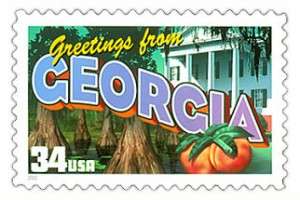Hearings Held to Debate Georgia Casino Gambling
Georgia’s Senate Preservation of the HOPE Scholarship Program Study Committee held hearings to discuss the possibility of launching a casino gambling industry in the state this week. The standing room-only hearings were held Monday and Tuesday in Atlanta.
Georgia is currently a barren gambling landscape, with just the lottery as an option for those who want to test their luck. Nearby states North Carolina, Florida, Mississippi, and Louisiana have destination gambling resorts, but getting to any of those places requires a lengthy drive or plane ride. For instance, to get to the closest casino of any significance, Harrah’s Cherokee in North Carolina, it would take about three hours by car from the north side of Atlanta. Aside from underground poker games, of which there are many, there are simply no gaming options in Atlanta, much less the rest of Georgia (though southern Georgia is certainly much closer to Florida casinos).
 The primary reason lawmakers are actually willing to discuss this issue is to help fund Georgia’s HOPE Scholarship. Launched in 1993, the HOPE Scholarship helps defray the cost of tuition for Georgia residents attending in-state schools, both public and private. HOPE also funds many Pre-K programs throughout the state. The HOPE Scholarship is currently funded by proceeds from lottery ticket sales, but Chip Lake, member of the Study Committee, said it’s not enough. Speaking with Atlanta’s WSB-TV, Lake said, “Profits have been good, percentages have been good but at the end of the day, it’s not keeping up with demand.”
The primary reason lawmakers are actually willing to discuss this issue is to help fund Georgia’s HOPE Scholarship. Launched in 1993, the HOPE Scholarship helps defray the cost of tuition for Georgia residents attending in-state schools, both public and private. HOPE also funds many Pre-K programs throughout the state. The HOPE Scholarship is currently funded by proceeds from lottery ticket sales, but Chip Lake, member of the Study Committee, said it’s not enough. Speaking with Atlanta’s WSB-TV, Lake said, “Profits have been good, percentages have been good but at the end of the day, it’s not keeping up with demand.”
It is a bit more complicated than this, but in a nutshell, Georgia high school students can earn a HOPE Scholarship by earning a 3.0 grade point average in high school and can continue to receive the scholarship by maintaining that level of academic achievement in college. It has been a wildly successful program, but the problem is, as Lake mentioned, it has been too popular. There is not enough money to keep paying out scholarships.
Because of this, benefits have been reduced and requirements are gradually increasing. In 2011, the HOPE Scholarship stopped paying for books and mandatory school fees. New “academic vigor” requirements took effect this year, as well, which require high school students to enroll in upper-level courses. This requirement will continue to get tougher through 2017.
To counter this somewhat, the Zell Miller Scholarship (named after former Georgia Governor and Senator, Zell Miller, who helped create the HOPE Scholarship) was created in 2011 to pay all of the tuition for select top students who enroll in public colleges. It pays $4,300 a year for those who go to private schools.
As great as it is, the HOPE Scholarship does not pay the entire cost of tuition, but rather pays a portion based on the school and credit hours. For example, someone who takes 15 credit hours at Georgia Tech this semester will receive $3,495 of the semester’s $4,906 tuition.
The hearings this week were not just scheduled on a whim. While they are only initial talks, they were held to begin the discussion of HB 677, a bill introduced by State Representative Ron Stephens (R – Savannah) in March which would legalize casinos in the state. The Georgia Constitution already divides the state into five licensing regions; HB 677 would authorize the construction of one casino resort in each plus an additional one in region one, which includes the sprawling Atlanta metropolitan area. That second casino would be restricted in terms of size while the others would not.
A benefit of that plan would be to not only spread out the casinos to make them accessible to people throughout Georgia, but as Lake said, “It is a limited bill that allows for destination casinos around the state so you will not see a replication of Atlantic City here.”
The casinos would actually be taxed very little, with only 12 percent of gross gaming revenues going to the state, presumably funneled mostly to the HOPE Scholarship program. The licensing fee for the “primary casino” in region one (read: the big Atlanta casino) would be $25 million, while the fee for the rest would be $10 million each. Licenses would be good for 15 years.
Atlanta has already been attracting the attention of casino companies looking to build properties as soon as they are given the green light. MGM Resorts International has already proposed a $1 billion gaming resort, which would include non-gaming facilities such as dining, shopping, and other entertainment. Jim Murren Chairman and CEO of MGM said at the hearing that his development would be much more than a casino. “We’re one of largest hoteliers in the United States and one of the largest retailers in the United States,” he said. “We don’t build ‘slot boxes.’”
Atlanta is seen as a prime spot for new casino development, as it is home to the world’s busiest airport and is a major convention destination. There are currently two huge construction projects going on in the Atlanta area: the Atlanta Falcons are building a new stadium next to the Georgia Dome in downtown Atlanta and the Atlanta Braves are building a new stadium and multi-use complex just north of Atlanta in eastern Cobb County. These have generated thousands of construction jobs and Murren said Atlanta should “Keep the momentum going….”
He estimates that an MGM project would create 3,000 to 4,000 temporary construction jobs and 4,000 to 5,000 permanent jobs.
Another hearing will be held on November 2nd in Savannah. There has been no movement on the casino gambling bill yet, but it does at least seem like some momentum has been built. The HOPE Scholarship Program Study Committee will need to submit a report to the Georgia legislature by December 1st with its recommendation on whether or not the state should move forward with possible legislation. Both House and Senate would then have to approve the bill in order for it to be put on the November 2016 ballot for a statewide vote.




















COMMENTS